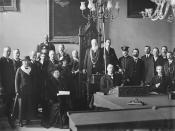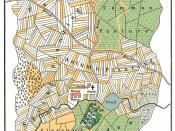Feudalism was a title given to a series of medieval contractual relationships within the upper classes, by which a lord granted land to his men in return for military service. It was further characterized by the localization of political and economic supremacy in the hands of lords and their vassals and by the exercise of that power from the base of castles, each of which subjugated the region in which it was located1. This formed a pyramidal type of hierarchy. The term feudalism therefore necessitates a division of governmental power disseminating over diverse castle-dominated districts downward through lesser nobles2. Feudalism can also refer to social and economic relationships between the peasants and their lords; this is manorialism.
People of the Middle Ages never used the term feudalism. It was a term formulated in the sixteenth century by royal lawyers, largely in England, to explain the decentralized and intricate social, political, and economic society out of which the modern state was surfacing3.
The term "feudalism" was founded on the German vieh, or "cow," the measure of prosperity among the early Germans, a term that yielded the medieval word fief. "Fief" simply referred to "something of value." In the agricultural world of the time, "something of value" was generally land4. However, these royal lawyers imagined this land under the rule of a dominant king who allocated much of it to his faction, men of honour who were well suited for governing and giving battle due to their breeding and upbringing5.
It has been argued that historians have deciphered medieval documents and histories in terms of this perception, and that, when these documents are examined more narrowly, there is essentially very little evidence that society was really organized in such a fashion6. This may very well be true, but a new and different...


